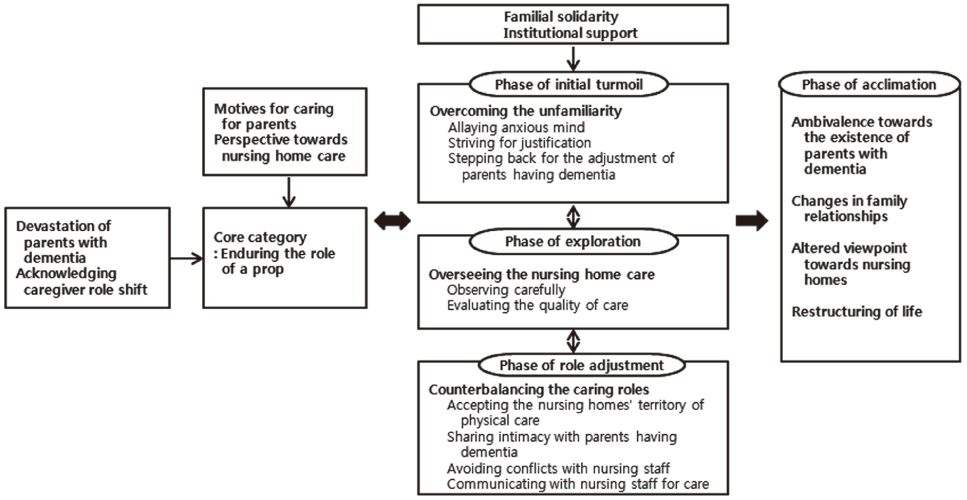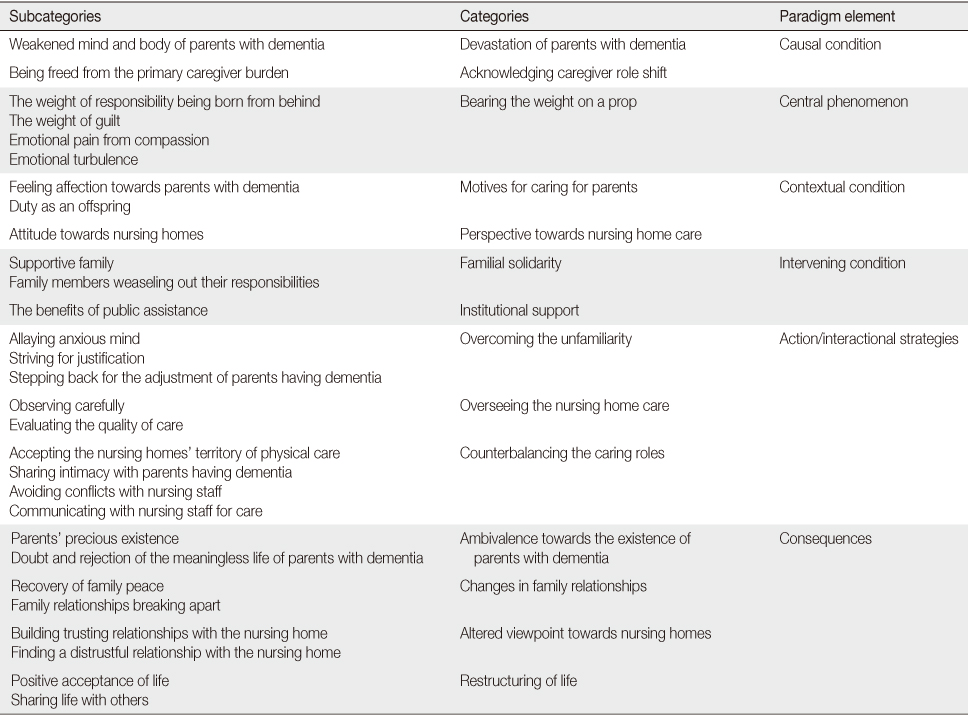Articles
- Page Path
- HOME > J Korean Acad Nurs > Volume 44(1); 2014 > Article
-
Original Article
- The Experience of Adult Korean Children Caring for Parents Institutionalized with Dementia
- Suhye Kwon, Young-Sook Tae
-
Journal of Korean Academy of Nursing 2014;44(1):41-54.
DOI: https://doi.org/10.4040/jkan.2014.44.1.41
Published online: February 28, 2014
College of Nursing, Kosin University, Busan, Korea.
- Address reprint requests to: Tae, Young-Sook. College of Nursing, Kosin University, 262 Gamcheon-ro, Seo-gu, Busan 602-702, Korea. Tel: +82-51-990-6446, Fax: +82-51-990-3031, taehope@kosin.ac.kr
• Received: August 19, 2013 • Revised: September 3, 2013 • Accepted: December 29, 2013
© 2014 Korean Society of Nursing Science
This is an Open Access article distributed under the terms of the Creative Commons Attribution NoDerivs License. (http://creativecommons.org/licenses/by-nd/4.0/) If the original work is properly cited and retained without any modification or reproduction, it can be used and re-distributed in any format and medium.
Abstract
-
Purpose
- The purpose of the study was to explore and describe the experience of adult Korean children who are caregivers for parents institutionalized with dementia.
-
Methods
- Participants were fourteen adult children caregivers of elders institutionalized with dementia. Data were collected through in-depth unstructured interviews with individual participants from August to November, 2012. Theoretical sampling was used to the point of theoretical saturation. Data were analyzed using Strauss and Corbin's Grounded Theory Method.
-
Results
- From open coding, 67 concepts, 29 sub-categories, and 14 categories were identified. Analysis revealed that the core category of the experience of adult children caring for their parents institutionalized with dementia was 'enduring the role of a prop' consisting of four phases: initial turmoil, exploration, role adjustment, and acclimation. To manage the role of a prop, participants utilized various action/interactional strategies such as overcoming the unfamiliarity, overseeing the nursing home care, and counterbalancing the caring roles. As a result, participants experienced ambivalence towards the existence of parents with dementia, changes in family relationships, altered viewpoint towards nursing homes, and restructuring of life.
-
Conclusion
- In-depth understanding of the experience will guide nurses to promote effective interventions in order to better support the Korean family caregivers of parents institutionalized with dementia.
- 1. Ministry of Health & Welfare. National dementia strategy 2013-2015 [Internet]. Seoul, Author. 2012;cited 2013 May 10. Available from: http://www.mw.go.kr/front_new/al/sal0301vw.jsp?PAR_MENU_ID=04&MENU_ID=0403&BOARD_ID=140&BOARD_FLAG=00&CONT_SEQ=274723&page=1
- 2. Lee YW, Park KH, Seong YS. A study on changes of primary caregivers' fatigue, depression and life satisfaction by using dementia day care services. J Korean Acad Adult Nurs. 2008;20(3):443–451.
- 3. Kwon JD, Go HJ, Lim SE, Lee SH, Chang WS, Lee YJ. Dementia and family. Seoul: Hakjisa Publisher; 2002.
- 4. Kim KB, Park MS, Sok S. A study on middle-aged people's preparation for old age life and their perception of long-term care facilities. J Korean Acad Community Health Nurs. 2008;19(3):480–494.
- 5. Ryan AA, Scullion HF. Nursing home placement: An exploration of the experiences of family carers. J Adv Nurs. 2000;32(5):1187–1195.ArticlePubMed
- 6. Bauer M, Nay R. Family and staff partnerships in long-term care. A review of the literature. J Gerontol Nurs. 2003;29(10):46–53.Article
- 7. Gaugler JE, Mittelman MS, Hepburn K, Newcomer R. Clinically significant changes in burden and depression among dementia caregivers following nursing home admission. BMC Med. 2010;8:85. http://dx.doi.org/10.1186/1741-7015-8-85ArticlePubMedPMCPDF
- 8. Lim D, Park M. Family member's caregiving stress and satisfaction of care for patients with dementia in long term care facilities and day care centers. J Korean Acad Adult Nurs. 2010;22(4):384–394.
- 9. Lee YJ, Kim JH, Kim KB. An ethnography on stigma of families having old people admitted to nursing home in Korea. J Korean Gerontol Soc. 2010;30(3):1005–1020.
- 10. Bowers BJ. Family perceptions of care in a nursing home. Gerontologist. 1988;28(3):361–368.ArticlePubMed
- 11. Kim TH, Han EJ. Factors related to family caregiver satisfaction with the nursing home after placement of a elderly with dementia. J Korean Gerontol Soc. 2007;27(3):579–596.
- 12. Jablonski RA, Reed D, Maas ML. Care intervention for older adults with Alzheimer's disease and related dementias: Effect of family involvement on cognitive and functional outcomes in nursing homes. J Gerontol Nurs. 2005;31(6):38–48.Article
- 13. Pillemer K, Suitor JJ, Henderson CR Jr, Meador R, Schultz L, Robison J, et al. A cooperative communication intervention for nursing home staff and family members of residents. Gerontologist. 2003;43(Spec No 2):96–106.ArticlePubMed
- 14. Strauss A, Corbin J. Basics of qualitative research: Techniques and procedures for developing grounded theory. 2nd ed. Thousand Oaks, CA: Sage Publications; 1998.
- 15. Lincoln YS, Guba EG. Naturalistic Inquiry. Newbury Park, CA: Sage Publications; 1985.
- 16. Cho KS, Seo YH. Influencing factors on supporters' burden for the senile dementia elderly living in the facilities. Korean J 21st Century Soc Welf. 2012;9(2):209–229.
- 17. Kim SH. A study of the changes of the family life after the entrance into the residental care of the demented elderly [master's thesis]. Daejeon, Mokwon University. 2001.
- 18. The National Institute of The Korean Language. Korean standard unabridged dictionary [Internet]. Seoul, Author. 2013;cited 2013 June 1. Available from: http://www.korean.go.kr/09_new/index.jsp
- 19. Fleming AA. Family caregiving of older people with dementing illnesses in nursing homes: A lifeline of special care. Australas J Ageing. 1998;17(3):140–144. http://dx.doi.org/10.1111/j.1741-6612.1998.tb00056.xArticle
- 20. Bern-Klug M. The emotional context facing nursing home residents' families: A call for role reinforcement strategies from nursing homes and the community. J Am Med Dir Assoc. 2008;9(1):36–44. http://dx.doi.org/10.1016/j.jamda.2007.08.010ArticlePubMed
- 21. Zhan HJ, Feng Z, Chen Z, Feng X. The role of the family in institutional long-term care: Cultural management of filial piety in China. Int J Soc Welf. 2011;20:Suppl 1. S121–S134.ArticlePDF
- 22. Kang HS, Go KJ, Kim WO, Kim ES, Khim SY, Kim HL, et al. The lives of daughters-in-law who care for parents with dementia. J Korean Acad Nurs. 1999;29(6):1233–1243.ArticlePDF
- 23. Choi HK. A comparative study on perceptions and expectations of families and care workers on elder care services in nursing facilities. Fam Cult. 2010;22(4):1–31.Article
- 24. Bauer M, Nay R. Improving family-staff relationships in assisted living facilities: The views of family. J Adv Nurs. 2011;67(6):1232–1241. http://dx.doi.org/10.1111/j.1365-2648.2010.05575.xArticlePubMed
- 25. Berdes C, Eckert JM. The language of caring: Nurse's aides' use of family metaphors conveys affective care. Gerontologist. 2007;47(3):340–349.ArticlePubMed
- 26. Haesler E, Bauer M, Nay R. Staff-family relationships in the care of older people: A report on a systematic review. Res Nurs Health. 2007;30(4):385–398. http://dx.doi.org/10.1002/nur.20200ArticlePubMed
- 27. Hertzberg A, Ekman SL. 'We, not them and us?' Views on the relationships and interactions between staff and relatives of older people permanently living in nursing homes. J Adv Nurs. 2000;31(3):614–622.ArticlePubMed
- 28. Specht JP, Kelley LS, Manion P, Maas ML, Reed D, Rantz MJ. Who's the boss? Family/staff partnership in care of persons with dementia. Nurs Adm Q. 2000;24(3):64–77.ArticlePubMed
REFERENCES
Figure & Data
REFERENCES
Citations
Citations to this article as recorded by 

- The Association Between Cohabitation With Dementia Patients and Family Mental Health
Yoo J. Lee, In C. Hwang, Hong Y. Ahn
Alzheimer Disease & Associated Disorders.2025; 39(4): 328. CrossRef - Development of the Care Burden Scale for Family of Elderly in Nursing Facilities
Eun Jeong Kim, Kyung Mi Sung
Journal of Korean Academy of psychiatric and Mental Health Nursing.2024; 33(1): 80. CrossRef - A web-based care assistant for caregivers of the elderly: Development and pilot study
Hwawoo Jeon, Yong Suk Choi, Yoonseob Lim
DIGITAL HEALTH.2023;[Epub] CrossRef - Time in the State of Dementia Caregiving in South Korea: When Care Becomes (Non-)Waiting
Jieun Lee
Culture, Medicine, and Psychiatry.2023; 47(4): 898. CrossRef - Depression, anxiety, and sleep quality of caregivers of children with spinal muscular atrophy
Almala Pinar Ergenekon, Zeynep Gümüş, Cansu Yilmaz Yegit, Muruvvet Cenk, Aynur Gulieva, Mine Kalyoncu, Merve Selcuk, Seyda Karabulut, Gulten Ozturk, Ela Erdem Eralp, Olcay Unver, Bulent Karadag, Yasemin Gokdemir
Pediatric Pulmonology.2023; 58(6): 1697. CrossRef - Empathy and perceived burden in caregivers of patients with schizophrenia spectrum disorders
Rosaria Di Lorenzo, Anna Girone, Nunzio Panzera, Gianluca Fiore, Margherita Pinelli, Giulia Venturi, Federica Magarini, Paola Ferri
BMC Health Services Research.2021;[Epub] CrossRef - Family Members’ Experience in Caring for Elderly with Dementia in Long-Term Care Hospitals
Eun Kyoung Suh, Hye Ryoung Kim
Journal of Korean Gerontological Nursing.2020; 22(4): 335. CrossRef - Development and Validation of the Scale for Partnership in Care—for Family (SPIC-F)
Hye-Young Jang, Eun-Ok Song
International Journal of Environmental Research and Public Health.2020; 17(6): 1882. CrossRef - Partnership between staff and family in long-term care facility: a hybrid concept analysis
Hye-Young Jang
International Journal of Qualitative Studies on Health and Well-being.2020; 15(1): 1801179. CrossRef - Development and Psychometric Evaluation of a Fear of Dementia Scale for Community-Dwelling Older Adults
Minkyung LEE, Dukyoo JUNG
Journal of Nursing Research.2020; 28(3): e94. CrossRef - Predictors of Satisfaction with Care Services among Family Members of Older Adult Residents of Long-Term Care Facilities
Eun-Ok Song, Hye-Young Jang
International Journal of Environmental Research and Public Health.2020; 17(9): 3298. CrossRef - A Concept Analysis of Fear of Dementia
Minkyung Lee, Dukyoo Jung
Journal of Korean Academy of Community Health Nursing.2018; 29(2): 206. CrossRef - Caregiver burden and prevalence of depression, anxiety and sleep disturbances in Alzheimer's disease caregivers in China
Shuai Liu, Chonghui Li, Zhihong Shi, Xiaodan Wang, Yuying Zhou, Shuling Liu, Jing Liu, Tao Yu, Yong Ji
Journal of Clinical Nursing.2017; 26(9-10): 1291. CrossRef - The Effect of Post-Stroke Depression on Rehabilitation Outcome and the Impact of Caregiver Type as a Factor of Post-Stroke Depression
Dong-Heun Ahn, Yung-Jin Lee, Ji-Hun Jeong, Yong-Rok Kim, Jong-Bum Park
Annals of Rehabilitation Medicine.2015; 39(1): 74. CrossRef
The Experience of Adult Korean Children Caring for Parents Institutionalized with Dementia

Figure 1
Theoretical framework for enduring the role of a prop.
Figure 1
The Experience of Adult Korean Children Caring for Parents Institutionalized with Dementia
Relationships among Categories using Paradigm Model
Table 1
Relationships among Categories using Paradigm Model
 KSNS
KSNS
 E-SUBMISSION
E-SUBMISSION


 Cite
Cite

